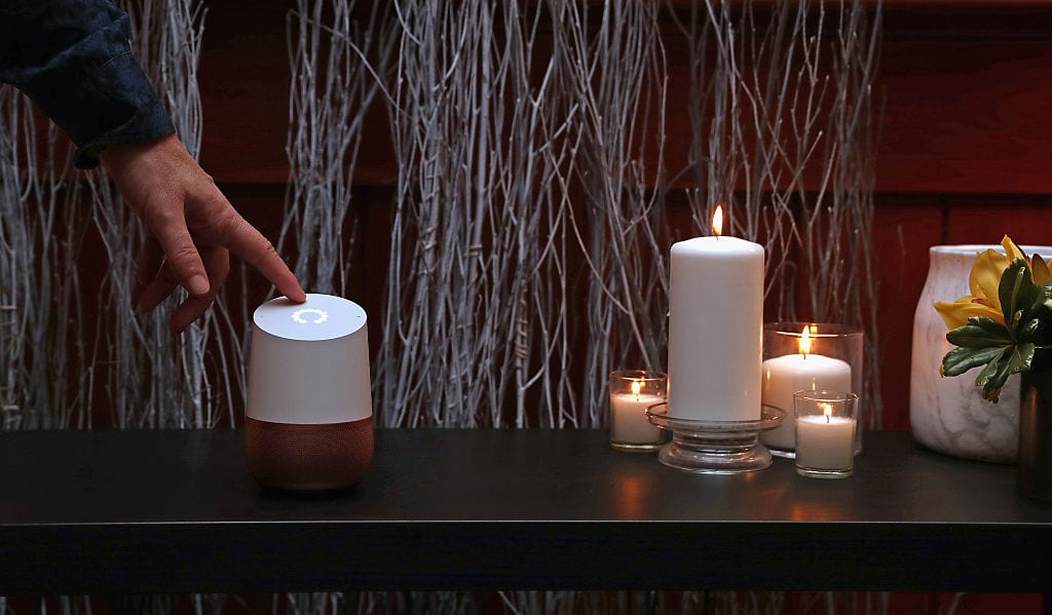Patents recently issued to Google provide a window into their development activities. While it’s no guarantee of a future product, it is a sure indication of what’s of interest to them. What we’ve given up in privacy to Google, Facebook, and others thus far is minuscule compared to what is coming if these companies get their way.
These patents tell us that Google is developing smart-home products that are capable of eavesdropping on us throughout our home in order to learn more about us and better target us with advertising. It goes much further than the current Google Home speaker that’s promoted to answer our questions and provide useful information, and the Google-owned Nest thermostat that measures environmental conditions in our home. What the patents describe are sensors and cameras mounted in every room to follow us and analyze what we’re doing throughout our home.
They describe how the cameras can even recognize the image of a movie star’s image on a resident’s t-shirt, connect it to the person’s browsing history, and send the person an ad for a new movie the star is in.
One patent, No. 10,114,351, reads, “According to embodiments of this disclosure, a smart-home environment may be provided with smart-device environment policies that use smart-devices to monitor activities within a smart-device environment, report on these activities, and/or provide smart-device control based upon these activities.”
So clearly they want to monitor us and report back what we are doing.
It goes on to describe an example in the usual patent legalese. But it’s worth providing here the exact description for you to see, in particular, the last sentence:
By way of example, the high-power processor 20 and the low-power processor 22 may detect when a location (e.g., a house or room) is occupied (i.e., includes a presence of a human), up to and including whether it is occupied by a specific person or is occupied by a specific number of people (e.g., relative to one or more thresholds). In one embodiment, this detection can occur, e.g., by analyzing microphone signals, detecting user movements (e.g., in front of a device), detecting openings and closings of doors or garage doors, detecting wireless signals, detecting an internet protocol (IP) address of a received signal, detecting operation of one or more devices within a time window, or the like. Moreover, the high-power processor 20 and the low-power processor 22 may include image recognition technology to identify particular occupants or objects.
In other words, the goal is to track us throughout the home — observing who is in each room, where we are moving, and what we are doing.
What’s of note is the patent that was awarded to one of Google’s star teams, associated with the development of the Nest thermostat — a breakthrough product with a microphone.
When Amazon first introduced their Alexa speaker, and Google followed with their own speaker, security experts warned that these devices could be turned around to spy on us, and that’s exactly what appears to be happening. While there are many good uses for adding sensors for home automation, the danger comes when they are being monitored and used by outside companies with an insatiable desire to know everything about us.
But there’s even more. According to The Atlantic:
A second patent proposes a smart-home system that would help run the household, using sensors and cameras to restrict kids’ behavior. Parents could program a device to note if it overhears ‘foul language’ from children, scan internet usage for mature or objectionable content, or use ‘occupancy sensors’ to determine if certain areas of the house are accessed while they’re gone— for example, the liquor cabinet. The system could be set to ‘change a smart lighting system color to red and flash the lights’ as a warning to children or even power off lights and devices if they’re grounded.
“The language of these patents makes it clear that Google is acutely aware of the powers of inference it has already, even without cameras, by augmenting speakers to recognize the noises you make as you move around the house,” The Atlantic wrote. “The auditory inferences are startling: Google’s smart-home system can infer ‘if a household member is working’ from ‘an audio signature of keyboard clicking, a desk chair moving, and/or papers shuffling.’ Google can make inferences on your mood based on whether it hears raised voices or crying, on when you’re in the kitchen based on the sound of the fridge door opening, on your dental hygiene based on ‘the sounds and/or images of teeth brushing.'”
If you think our privacy is compromised now, just wait. Until there’s some legislation passed to protect our privacy, there’s no stopping companies such as Google and Facebook from learning everything about what we do and who we are and selling the information to advertisers, insurance companies, and eventually, any entity that will pay. After all, that’s their business model.









Join the conversation as a VIP Member